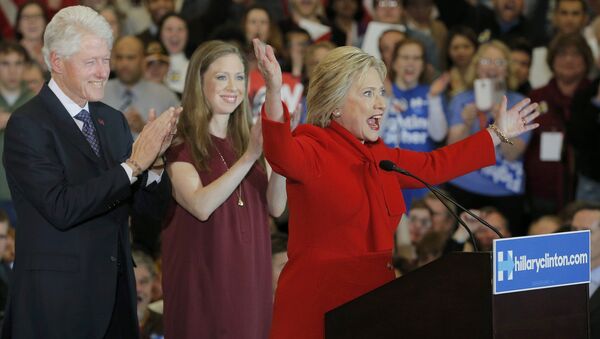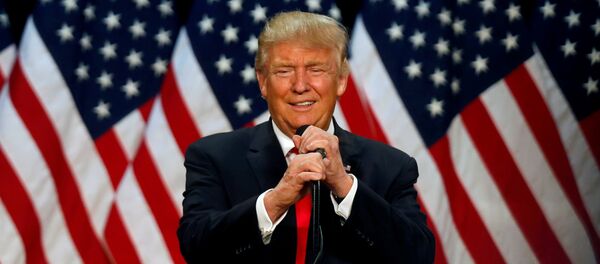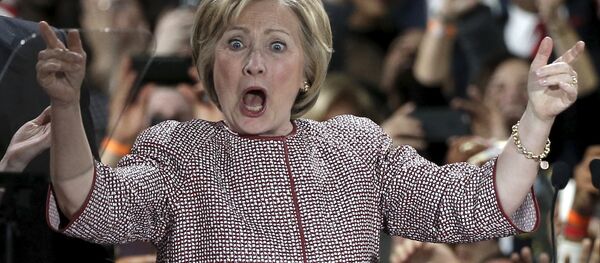A new Clinton administration may drag the country into a foreign-policy nightmare, warns A. Trevor Thrall, Associate Professor of Government and International Affairs at George Mason University.
"Imagine it is the morning of January 21st, 2017: President Hillary Clinton enters the Oval Office for her first daily briefing from the CIA. Without having to do much guessing we know that this briefing will be replete with terrible news about all the many fires burning around the world," Thrall writes in his article for the National Interest.
"The first decision will be to send thousands of American ground troops to eradicate the Islamic State in Iraq and Syria," Thrall notes, "Clinton's second ill-fated decision will be to attempt to restore and stabilize Iraq."
President Clinton's third decision will likely "reverse President Obama's plan to draw down the US military presence in Afghanistan," he underscores.
There is little if any doubt that Clinton will adopt a far more interventionist stance than her predecessor, Barack Obama, given her policies as the US Secretary of State and her hawkish rhetoric as a presidential candidate.
"Hillary Clinton was a dogged champion for military intervention as Secretary of State. As a candidate, she has been among the most hawkish Democrats in living memory, outdoing most of this year's Republicans," the scholar remarks, adding that after winning the Oval Office Clinton will face "few obstacles in her desire to exert decisive leadership on the global stage."
Thrall envisions that US war hawks encouraged by Clinton could approve the permanent stationing of 50,000 US troops in Iraq to prevent Daesh from rising and to help the country's economy to "recover."
However, both Syria and Iraq would become yet another quagmire for the US military force. Moreover, by expanding its military campaign in the region Washington risks aggravating further tensions with Russia.
Even if NATO and the Pentagon win in the short-term, there is no guarantee that a new terrorist threat won't emerge in the long-run in the Middle East.
"The military victory will have done absolutely nothing to resolve the fundamental sectarian and political conflicts that have riven Iraq since the fall of Saddam Hussein. Nor will the victory have made the US any more capable of fostering stability and democracy. Beyond this we cannot forget that ISIS [Daesh] itself grew out of the chaos that followed the 2003 invasion," Thrall stresses, adding that a new intervention would only raise the risks of future terrorist attacks against the US and its allies.
As for Afghanistan, "despite 2,300 American casualties and roughly a trillion dollars spent" in the country to date, all of Washington's efforts have been fruitless: Afghanistan is still unable to survive without life support.
If Clinton reverses Obama's decision to withdraw US troops from the Central Asian region, Washington's treasure and the Americans' lives could be wasted in vain.
"How likely is this nightmare scenario?" the scholar asks.
"All three decisions are entirely plausible given the decisions made by the previous two presidents. Hillary Clinton's own behavior as Secretary of State and her comments on the campaign trail only make them more so," he stresses.
"Hillary is a warmonger. She pushed the Obama regime into the destruction of a stable and largely cooperative government in Libya… She has pushed for 'regime change' in Syria… She brought neoconservative Victoria Nuland, who arranged the coup that overthrew the democratically elected president of Ukraine, into the State Department. Hillary has called President Vladimir Putin of Russia the 'new Hitler.' Hillary as president guarantees war and more war," Roberts wrote.
The truth of the matter is that Hillary Clinton is backed by the US omnipotent military industrial complex and she will represent its interests, not those of the American people, he noted.
It seems Jeffrey Sachs, a world-renowned professor of economics, shares a similar stance. In his February op-ed for the Huffington Post entitled "Hillary Is the Candidate of the War Machine" he wrote:
"There's no doubt that Hillary is the candidate of Wall Street. Even more dangerous, though, is that she is the candidate of the military-industrial complex."
"The idea that she is bad on the corporate issues but good on national security has it wrong," he warned.




